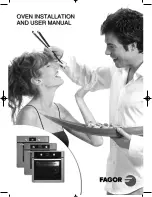
_ Electronic Ovens _ rev. 0 ________________________________________________________________ KF 981 EV _
_________________________________________________________________________________________ page 19 _
3.5.2
3.5.2
3.5.2
3.5.2 Convection cooking (dry heat)
Convection cooking (dry heat)
Convection cooking (dry heat)
Convection cooking (dry heat)
The heating elements heat the dry air inside the cooking chamber. This heated air is evenly
distributed by the high speed of the fans. This gives an even temperature throughout the
cooking chamber and even cooking even when the oven is full.
This means that different types of food can be cooked on the various shelves (as long as they
need the same cooking temperature) without flavours and smells being mixed together.
The cooking chamber temperature can be set between 50°C and 270°C.
Besides evenly browning the food without having to turn it, convection cooking can be used
to cook au gratin and is particularly convenient for rapid defreezing, for sterilising preserves and
drying mushrooms and fruit.
3.5.3
3.5.3
3.5.3
3.5.3 Conv steam cooking (dry heat + moist heat)
Conv steam cooking (dry heat + moist heat)
Conv steam cooking (dry heat + moist heat)
Conv steam cooking (dry heat + moist heat)
This type of cooking exploits the combination of dry and moist heat. The heat is dosed by the
climate regulation system which can divide, in percentage, the production of steam and the
production of dry heat (drying the cooking chamber), optimising the cooking climate for each
dish.
The cooking chamber temperature can be set between 50°C and 270°C.
The fact of using a hot-moist climate inside the cooking chamber with variable temperature and
moisture levels, is the most convenient and efficient way of cooking: cooking times are reduced,
the surface of the foods remains soft and does not form a crust, there is little weight loss and
the fatty mass is reduced.
The special hot-moist climate at low temperatures is ideal for re-conditioning food.
3.6
3.6
3.6
3.6 Other cooking techniques
Other cooking techniques
Other cooking techniques
Other cooking techniques
3.6.1
3.6.1
3.6.1
3.6.1 Core temperature cooking technique
Core temperature cooking technique
Core temperature cooking technique
Core temperature cooking technique
The temperature can be set inside the core of the food to be cooked, using the special
needle core probe that is supplied with the oven. The probe must be pushed into the centre of
the food in the thickest part, avoiding the bones. Place the food inside the cooking chamber
and pull out the thermal probe lead and close the oven door. The probe plug must be plugged
into the special socket (see Fig. 1) at the bottom of the control panel. Press the push button
to select the core cooking temperature (led alight on
) between 0°C and 100°C using knob
no. “2”, the temperature is shown on the temperature display.
When a cooking cycle is started with a core probe stage included (the time display shows the
wording “Prob”), when the set temperature is reached inside the food the cooking cycle passes
onto the next stage no matter what time has been set. If the core probe is activated within any
of the four stages, with the other three deactivated, the cooking cycle finishes automatically
when the set temperature inside the food is reached, no matter what time has been set.
Cooking with the core probe can be graduated over the four stages (for very delicate
cooking) and, for each stage, the temperature and the climate inside the cooking chamber can
be set besides the temperature inside the food.
As the thermal probe is a needle which can easily be removed or broken, we advise setting
the cooking time for the stage that it is used in.
If the probe is connected and operating, the stage finishes when the set temperature is
reached; otherwise, if the probe is not connected or is broken, the stage finishes at the set time.
If the probe is not connected or is broken, when the cooking cycle starts the beeper sounds
intermittently for 10 seconds, the time display shows the flashing message “Prob” and the
previously set temperature disappears from the temperature display
(
---- ---- ----
)
.
The core temperature of the food can also be measured (when no temperature has been set):
it is sufficient to slide the needle probe into the food.











































